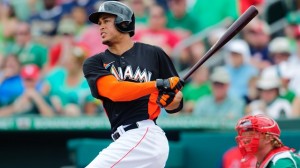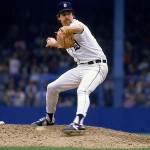Hi there. Its time to write about the “silly season” of baseball, now that they’ve announced the finalists for each of the major awards.
This year, I changed the way I have traditionally written this post and did not bother to check the pulse of the awards (or look at Players of the Month) until season’s end, since they’re generally useless for predicting these major awards. So no running narrative of who was “in the lead” for the MVP at the all-star break.
Here’s my predictions for how the awards will go. Important note: This is not necessarily how I believe the awards should go, it is how I think the current electorate will vote … though I do tend to believe that the MVP award in particular is not just about naming the WAR leader in the league.
The writers have to submit their ballots at the end of the season; I finished this post in early October but waited until the awards season to arrive to publish it. Thus, it contains no inclusion of any post-season accolades or accomplishments since the votes were already in before the playoffs started. Therefore, I’ve left in my gross errors once the 3 finalists were announced.
How do I think the voting will go?
- AL MVP: Altuve, Judge, Ramirez, Betts, Simmons (perhaps Kluber/Sale as 5th place vote-getters instead of their teammates)
- NL MVP: Stanton, Arenado, Goldschmidt, Bryant, Rendon
- AL Cy Young: Kluber, Sale, Severino, Carrasco, Verlander
- NL Cy Young: Scherzer, Kershaw, Strasburg, Greinke, Jansen
- AL Rookie: Judge unanimously, then Benintendi, Gurriel
- NL Rookie: Bellinger unanimously, then DeJong, Kyle Freeman
- AL Manager: Molitor (Minn), Francona (Cle), Girardi (NYY)
- NL Manager: Baker (Wash), Lovullo (Ariz), Counsell (Mil)
Actual Award Results added as they were awarded (updated post-publishing)
- AL MVP: Altuve wins easily.
- NL MVP: Stanton *barely* beats out Votto in a vote that really surprised me.
- AL Cy Young: Kluber wins easily, getting 28 of 30 1st place votes.
- NL Cy Young: Scherzer wins convincingly, getting 27 of 30 1st place votes.
- AL Rookie: Judge unanimously
- NL Rookie: Bellinger unanimously
- AL Manager: Molitor wins, followed by Francona, Hinch and Girardi.
- NL Manager: Lovullo wins, then Roberts, Black, Counsell and Baker with one 1st place vote.
My prediction results: 7 or 8, missing badly on NL Mgr of the year.
Links to other awards that I didn’t predict this year (again, updated post-publishing as they’re announced)
- Relievers of the Year: announced 10/28/17; Kenley Jensen repeats and Craig Kimbrel wins in the AL.
- Roberto Clemente Award: Anthony Rizzo wins for 2017.
- Hank Aaron Award: Jose Altuve and Giancarlo Stanton for 2017
- Gold Gloves: Finalists announced 10/26/17. Gold Glove Awards for 2017 here. No Nats mentioned; both Anthony Rendon and Michael Taylor‘s strong cases went for naught. See separate post on the topic in this space.
- Fielding Bible: no Nats winners.
- Wilson Defensive Player of the Year: Buxton, who also was named a GG and Fielding Bible winner. They also name a Fielding Bible-esque overall defensive winner by position.
- Silver Sluggers: Daniel Murphy named for the 2nd year in a row.
- Comeback Players of the Year: goes to Greg Holland and Mike Moustakas. I thought Ryan Zimmerman would be a lock for this … but Holland makes a lot of sense too.
- BA Executive of the Year: Brian Cashman of the Yankees …who then went through a bit of a charade with the team on whether he was coming back. This may have been more of an award for his amazing work LAST year, when he flipped players at the deadline for a ton of prospects, got one of the back in FA (Aroldis Chapman) and then suddenly made the playoffs one year after selling.
- Sporting News Executive of the Year: Chris Antonetti of the Indians.
- Edgar Martinez DH of the Year: goes to Nelson Cruz, my perennial fantasy stud.
- J.G. Taylor Spink Reporter of the year: Sheldon Ocker, who covered the Indians for more than 30 years before retiring in 2013. Um … how is a *retired* sports writer getting this award? Why am I tracking it here with player awards?
Other links to awards worth noting
- MLB.com Players/Pitchers/Rookies of the Month.
- Players choice awards: Ryan Zimmerman honored as comeback player of the year; other awards mirror our predictions for MVP, Cy Young and Rookies of the Year above.
- Esurance MLB Awards: Rendon‘s 6-6 day earns MLB’s best performance for 2017.
Discussion:
- AL MVP : I’ve got Altuve over Judge in a race that shouldn’t be that close. Altuve was dominant all year, holds a sizeable advantage in bWAR (more than a win) over any other AL hitter and is the heart of the best team in the league. Judge would be the winner had he had a 2nd half similar to his 1st half, and was the clear winner of the “Narrative” conversation. However, Altuve’s defensive additions and Judge’s distinct lack of “clutchness” (he was dead last or close to it in terms of clutch hitting). Judge just loses out at doing what just a couple of players have ever done; win the RoY and MVP in the seam season (Fred Lynn, . Outside the top two, I think it could be any one of a slew of guys. I think Trout‘s injury costs him in the race but he still is named on a bunch of ballots, but not enough to overcome Betts (who gets votes as Boston’s best player). I think Jose Ramierez should be in the discussion as Cleveland’s best hitter, but he toils in anonymity for the most part and I wouldn’t be surprised to see Sale/Kluber slide into 5th. Also, don’t sleep on Andrelton Simmons, who has become a force on both sides of the ball this year. With the finalists announced; I did get the top 3 correct at least and feel like i’ve got the right order.
- NL MVP: I think Stanton‘s monstrous season (he has nearly 30 more homers than the next best NL hitter) puts him over the top in a year when the best NL teams (Washington, Los Angeles in particular) do not have dominant offensive players leading the way and making their case. Washington’s best WAR position player is Rendon, who wasn’t even named an All-Star, and the Dodger’s best position player by bWAR is Justin Turner, who isn’t exactly mentioned in the MVP talks. I think the 2nd and 3rd place votes go to the clear leaders of the two surprise wild card teams (Arenado and Goldschmidt), then 4th and 5th go to Rendon and Kris Bryant in some order. Bryant has been amazingly quiet despite continuing to be a top player and being the defending MVP; perhaps its Cubs fatigue after their amazing win last fall. Joey Votto fails to get mentioned despite his amazing season toiling for the last place Reds. With the finalists announced; I was shocked that the voters gave Votto the votes to get into the top 3; again, more evidence of the electorate getting “smarter” and appreciating the best performances. I still think it goes Stanton 1st, Goldschmidt 2nd, Votto 3rd.
- AL Cy Young: Despite Sale‘s 300 strikeout season, Kluber leads the league in most every pitching statistical category and should win this award. Sale got blasted in one of his last starts of the season, possibly changing some voter’s impression of him at the death of the season. I wouldn’t be surprised if the voting is really close though. Past the top two it could be anyone: Verlander stayed in the same league and caught on fire upon his trade to Houston, Luis Severino will get the attention of the many NE-focused voters. I have no idea who might come in 5th; Carrasco has been great, but it could also be some random closer. With the finalists announced; I did get the top 3 right at least but feel like its going to be really, really close between Sale/Kluber.
- NL Cy Young: Both the leading candidates missed time due to injury, but Scherzer only missed a couple of starts and has sizeable lead on Kershaw in both bWAR and in total Ks. I could see either guy eventually winning though; you can make arguments for either. Kershaw will have many more innings than he has last year, when he still managed to come in 5th in the vote, and he’ll have a significant lead in ERA. Past these two, there’s a slew of good hurlers who deserve recognition. Strasburg has put his name firmly in the argument with his scoreless inning streak, and ironically as of mid-September neither Stras or Scherzer was the bWAR pitching leader on his own *team* (Gio Gonzalez was). Former Nat Farmhand Robbie Ray has had a great season, as has Greinke, as has Alex Wood and his gaudy W/L record. 3/4/5 could go a number of ways. And don’t forget Kenley Jansen, who gave up about as many earned runs this year as he did unintentional walks. Some even mention Jacob deGrom as a back of the ballot guy, but I think there’s enough voters impressed by Jansen’s season that he’ll make it in there. With the finalists announced; I got the top 3 right and think i’ve got the right order too.
- AL Rookie: No surprise here; if Judge doesn’t win unanimously then someone needs their vote revoked. More interesting will be predicting the 2nd and 3rd place guys. Did Benintendi (the pre-season favorite) do enough? Did Gurriel and his Rookie of the Month award lift him? Are there any pitchers worth mentioning? Keith Law mentioned Oakland’s Matt Olsen as a good 3rd place player but he didn’t play nearly as much as these others. Rafael Devers? Who knows. With the finalists announced; I missed on Mancini versus Gurriel, but again that’s your 3rd place winner in this one-horse race.
- NL Rookie: As with Judge, this should be unanimous as well, with Bellinger setting a rookie HR record for the Dodgers (who are easily the most illustrious of teams when it comes to rookie history). Does pre-season RoY favorite Dansby Swanson even get mentioned on ballots after his struggle of a 2017 season? Who comes in third in the NL? With the finalists announced; I missed on Bell versus Freeman but either way they’re playing for 2nd place.
- AL Manager: The Twins went from 100 losses to the playoffs; I think Molitor wins this narrative-driven award thanks to this feat. Franconia might get it b/c of Cleveland’s amazing winning streak. With the finalists announced; Missed on Hinch versus Girardi, but does not change my prediction.
- NL Manager: I can’t see how Baker does NOT win this award,given the ridiculous injury issues he worked around and the whole-sale bullpen change at mid-season. With the finalists announced; Baker does not even make the top 3. I guess my homer-ism missed out here. I got just one of the 3 finalists right, with the voters picking Dave Roberts and Bud Black instead of Baker and Counsell. Re-guessing now that I see the finalists I think Bud Black is the new favorite, with Arizona’s Lovullo 2nd and Roberts third.

